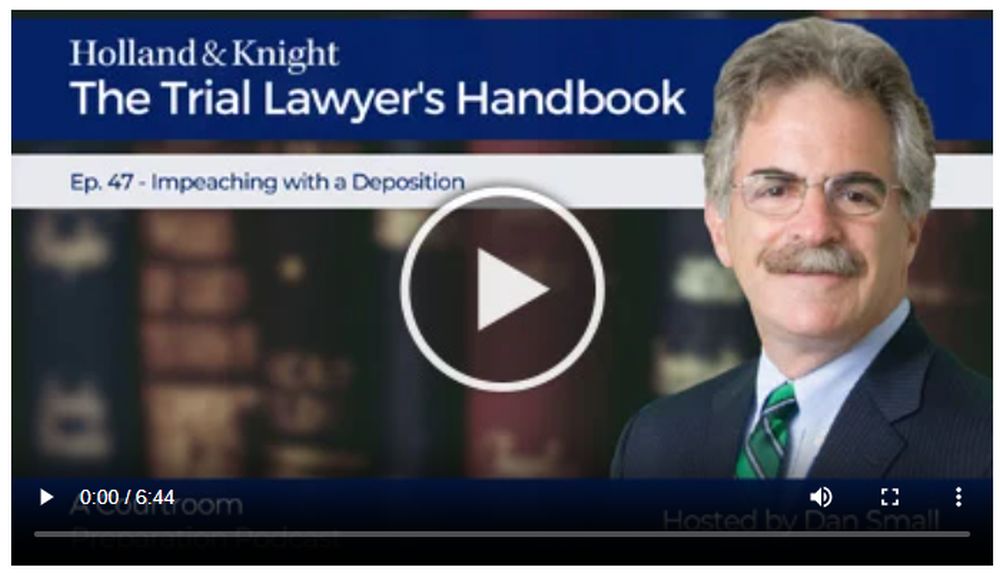In this episode of "The Trial Lawyer's Handbook" podcast series, litigation attorney Dan Small discusses what to do when impeaching with a deposition. Impeachment with a prior inconsistent statement is difficult if the witness never made any prior statement on the subject. Mr. Small provides helpful insight into how to properly handle this particular situation in the courtroom.
Listen and subscribe on Amazon.
Listen and subscribe on Apple Podcasts.
Listen and subscribe on SoundCloud.
Listen and subscribe on Spotify.
Watch and subscribe on YouTube.
Mr. Small is also the author of the new American Bar Association (ABA) book Lessons Learned from a Life on Trial: Landmark Cases from a Veteran Litigator and what They Can Teach Trial Lawyers.
Podcast Transcript
Dan Small: Impeachment with a prior inconsistent statement begins, of course, with a prior statement. What is it? Witness statements can be sorted into three basic categories.
Number one, statements made under oath with a transcript, such as a deposition, grand jury proceeding or pretrial hearing.
Number two, statements made under oath without a transcript, such as an affidavit.
Number three, everything else, such as a statement to a police officer or investigator.
Let's focus on the first category, specifically depositions. By far the most common way that witnesses are impeached in a civil case is by confronting them with the transcript of their deposition. In theory, this ought to be ideal. After all, it's a sworn statement, carefully considered and transcribed by a professional stenographer, reviewed, considered and now there for the jury to see. But the reality is it rarely goes as smoothly as it should.
The problem normally begins with the deposition itself. There are at least three principal reasons for this.
Number one: The questions aren't clear. Deposition questions are often tangled, fragmented or otherwise muddled. Some of that is inevitable. A lawyer taking a deposition is normally questioning the witness for the first time, and the lawyer doesn't necessarily know what the witness is going to say or how they're going to say it. Because the testimony may take all kinds of unexpected twists and turns, the lawyer has to make up many of the questions on the fly. Some degree of fumbling is always going to occur.
However, lawyers tend to make matters worse in a variety of ways. First, some lawyers barely prepare their deposition questions at all. Just because you can't prepare for everything doesn't mean you can't prepare for anything. Prepare as much as you can, and that will help you, even when you're operating far away from your outline.
Second, many lawyers structure their questioning of deposition witnesses around a stack of exhibits. That's fine to a point, but it often results in awkward or ungainly questions because the lawyer tends to incorporate material from the documents into the questions, or assume that everyone's looking at the same document in the same way. Also, many attorneys become prisoners of their exhibit stack and fail to ask questions about other topics, or to follow up on answers not strictly tied to a document.
Third, many lawyers aren't thinking about trial at all. Lawyers typically examine many more witnesses by deposition than a trial. The ratio is probably greater than 100 to 1 for many. Because so few civil cases go to trial, the attorney is often thinking solely about obtaining concessions for use in summary judgment or other purposes, and little else.
Number two: The answers aren't clear. Deposition witnesses, like trial witnesses, often give vague or rambling or incomplete answers. If a deposition witness gives you such an answer, stop and fix it on the spot. You're not going to be able to fix it once that transcript is written in stone.
So, for example:
What color was the traffic light?
Answer: Like I said, I seem to remember, I think, I think that, well, I think the light was, well, it was more or less greenish looking.
Mr. Jones, was the traffic light green?
Yeah. Well, I guess so.
Mr. Jones, was the traffic light green?
Yes. Yes it was.
Number three: The lawyer didn't ask the right questions. Lawyers at trial are occasionally surprised by an unexpected answer from a witness. In particular, an answer that doesn't seem to match the deposition transcript. But every answer that surprises you may not involve an actual inconsistency. Perhaps a quick tutorial on depositions is in order here.
Depositions normally have three principal functions, right? A discovery function: The lawyer is learning the witness' version of the facts. A locking in function: The lawyer is both eliciting and recording the witness' testimony, making it harder for the witness to change it later. Number three, a cross-examination function: The lawyer is gleaning concessions for use at a later time, such as in a motion for summary judgment.
The first two functions normally require open-ended, non-leading questions, such as "What happened at the meeting?" The cross-examination function normally requires the opposite, leading questions such as "So Mr. Jones was not present at the meeting?"
A good examiner will typically switch back and forth between the different types of questions. Sometimes it's important to ask the open-ended questions, but then follow it with one or more leading questions to lock it in. Keep all three functions in mind.
For example, if you are over-focused in the deposition on the cross-examination function, you may well forget to ask open-ended questions, and therefore you're more likely to be surprised by the witness' trial testimony. This may lead to the following type of all-too-common exchange:
Question: Mr. Smith, you never mentioned that in your deposition, did you?
Answer: No. You never asked me.
Impeachment with a prior inconsistent statement is difficult if the witness never made any prior statement on the subject. Ask clear, uncluttered questions when taking a deposition, and insist on clear, uncluttered answers. You'll be glad you did if you have to use the transcript at trial. That's all.
The content of this article is intended to provide a general guide to the subject matter. Specialist advice should be sought about your specific circumstances.


